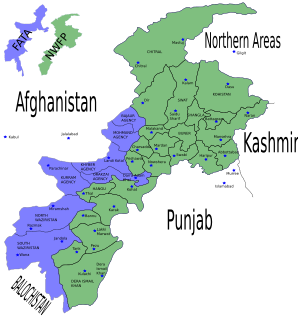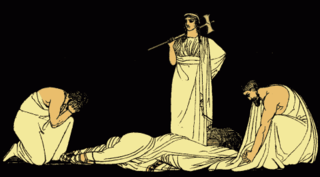The Khalistan movement is a Sikh separatist movement, which seeks to create a separate country called Khalistān in the Punjab region to serve as a homeland for Sikhs. The territorial definition of the proposed country Khalistan consists of both the Punjab, India along with Punjab, Pakistan and includes parts of Haryana, Himachal Pradesh, Jammu and Kashmir, and Rajasthan.

The Partition of India was the division of British India in 1947 which eventually accompanied the creation of two independent dominions, India and Pakistan. The Dominion of India became, as of 1950, the Republic of India (India), and the Dominion of Pakistan became, as of 1956, the Islamic Republic of Pakistan (Pakistan) In 1971, the People's Republic of Bangladesh (Bangladesh) came into being after Bangladesh Liberation War. The partition involved the division of three provinces, Assam, Bengal and Punjab, based on district-wide Hindu or Muslim majorities. The boundary demarcating India and Pakistan came to be known as the Radcliffe Line. It also involved the division of the British Indian Army, the Royal Indian Navy, the Indian Civil Service, the railways, and the central treasury, between the two new dominions. The partition was set forth in the Indian Independence Act 1947 and resulted in the dissolution of the British Raj, as the British government there was called. The two self-governing countries of Pakistan and India legally came into existence at midnight on 14–15 August 1947.

A princely state, also called native state, feudatory state or Indian state, was a vassal state under a local or regional ruler in a subsidiary alliance with the British Raj. Though the history of the princely states of the subcontinent dates from at least the classical period of Indian history, the predominant usage of the term princely state specifically refers to a semi-sovereign principality on the Indian subcontinent during the British Raj that was not directly governed by the British, but rather by a local ruler, subject to a form of indirect rule on some matters. In actual fact, the imprecise doctrine of paramountcy allowed the government of British India to interfere in the internal affairs of princely states individually or collectively and issue edicts that applied to all of India when it deemed it necessary.

The North-West Frontier region of the British Indian Empire was a difficult area to conquer in South Asia, strategically and militarily. It remains the western frontier of present-day Pakistan, extending from the Pamir Knot in the north to the Koh-i-Malik Siah in the west, and separating the modern Pakistani frontier regions of North-West Frontier Province, Federally Administered Tribal Areas and Balochistan from neighbouring Afghanistan in the west. The borderline between is officially known as the Durand Line and divides Pashtun inhabitants of these provinces from Pashtuns in eastern Afghanistan.

The 1947 Indian Independence Act is an Act of the Parliament of the United Kingdom that partitioned British India into the two new independent dominions of India and Pakistan. The Act received the royal assent on 18 July 1947, and thus modern-day Pakistan and India came into being on 15 August.
Arain are a major tribe found mainly in the provinces of Punjab and Sindh. They are chiefly associated with small-time farming or market gardening,

The history of the Republic of India begins on 26 January 1950. The country became an independent nation within the British Commonwealth on 15 August 1947. Concurrently the Muslim-majority northwest and east of British India was separated into the Dominion of Pakistan, by the partition of India. The partition led to a population transfer of more than 10 million people between India and Pakistan and the death of about one million people. Indian National Congress leader Jawaharlal Nehru became the first Prime Minister of India, but the leader most associated with the independence struggle, Mahatma Gandhi, accepted no office. The new constitution of 1950 made India a democratic country.

The insurgency in Punjab originated in the late 1970s, was a threat to the unity and integrity of India due to the militant Sikh ethno nationalism known as Khalistan movement. In the 1980s the movement had developed into a secessionist movement under the leadership of Jarnail Singh Bhindranwale. The Green revolution brought several socio-economic changes which along with factionalism of the politics in the Punjab state increased tension between a section of Sikhs in Punjab with the union Government of India. Pakistani strategists then began supporting the militant dimension of the Khalistan movement.
Dowry deaths are deaths of married women who are murdered or driven to suicide by continuous harassment and torture by their husbands and in-laws over a dispute about their dowry, making women's homes the most dangerous place for them to be. Dowry deaths are found predominantly in India, Pakistan, Bangladesh, and Iran. India reports the highest total number of dowry deaths with 8,391 such deaths reported in 2010, meaning there are 1.4 deaths per 100,000 women. Female dowry deaths account for 40 to 50 per cent of all female homicides recorded annually in India, representing a stable trend over the period 1999 to 2016. Adjusted for population, Pakistan, with 2,000 reported such deaths per year, has the highest rate of dowry death at 2.45 per 100,000 women.

The Provinces of India, earlier Presidencies of British India and still earlier, Presidency towns, were the administrative divisions of British governance in India. Collectively, they were called British India. In one form or another, they existed between 1612 and 1947, conventionally divided into three historical periods:
Anti-terrorism legislation are laws with the purpose of fighting terrorism. They usually, if not always, follow specific bombings or assassinations. Anti-terrorism legislation usually includes specific amendments allowing the state to bypass its own legislation when fighting terrorism-related crimes, under the grounds of necessity.

The Punjab Legislative Assembly or the Punjab Vidhan Sabha is the unicameral legislature of the state of Punjab in India. At present, it consists of 117 members, directly elected from 117 single-seat constituencies. The tenure of the Legislative Assembly is five years unless dissolved sooner. The current Speaker of the Assembly is Rana KP Singh. The meeting place of the Legislative Assembly since 6 March 1961 is the Vidhan Bhavan in Chandigarh.

The Defence of India Act 1915, also referred to as the Defence of India Regulations Act, was an emergency criminal law enacted by the Governor-General of India in 1915 with the intention of curtailing the nationalist and revolutionary activities during and in the aftermath of the First World War. It was similar to the British Defence of the Realm Acts, and granted the Executive very wide powers of preventive detention, internment without trial, restriction of writing, speech, and of movement. However, unlike the English law which was limited to persons of hostile associations or origin, the Defence of India act could be applied to any subject of the King, and was used to an overwhelming extent against Indians. The passage of the act was supported unanimously by the non-official Indian members in the Viceroy's legislative council, and was seen as necessary to protect against British India from subversive nationalist violence. The act was first applied during the First Lahore Conspiracy trial in the aftermath of the failed Ghadar Conspiracy of 1915, and was instrumental in crushing the Ghadr movement in Punjab and the Anushilan Samiti in Bengal. However its widespread and indiscriminate use in stifling genuine political discourse made it deeply unpopular, and became increasingly reviled within India. The extension of the law in the form of the Rowlatt Act after the end of World War I was opposed unanimously by the non-official Indian members of the Viceroy's council. It became a flashpoint of political discontent and nationalist agitation, culminating in the Rowlatt Satyagraha. The act was re-enacted during World War II as Defence of India act 1939. Independent India retained the law in a number of amended forms, which have seen use in proclaimed states of national emergency including Sino-Indian War, Bangladesh crisis, The Emergency of 1975 and subsequently the Punjab insurgency.

The 12th Cavalry is an armoured regiment of Pakistan Army. It was formed in the British Indian army in 1922 by the amalgamation of 22nd Sam Browne's Cavalry and 25th Cavalry.
A union territory is a type of administrative division in the Republic of India. Unlike the states of India, which have their own governments, union territories are federal territories ruled directly by the union government, hence the name "union territory"

The Female Infanticide Prevention Act, 1870, also Act VIII of 1870 was a legislative act passed in British India, to prevent murder of female infants. The Section 7 of this Act declared that it was initially applicable only to the territories of Oudh, North-Western Provinces and Punjab, but the Act authorized the Governor General to extend the law to any other district or province of the British Raj at his discretion.
The Arms Act, 1959 is an Act of the Parliament of India to consolidate and amend the law relating to arms and ammunition in order to curb illegal weapons and violence stemming from them. It replaced the Indian Arms Act, 1878.
Chaudhry Tariq Bashir Cheema is a Pakistani politician who is the current Federal Minister for Housing and Works, in office since 6 September 2018. He has been a member of the National Assembly of Pakistan, since August 2018. He served as the Federal Minister for States and Frontier Regions from 20 August 2018 to 6 September 2018.
Events in the year 1867 in India.










